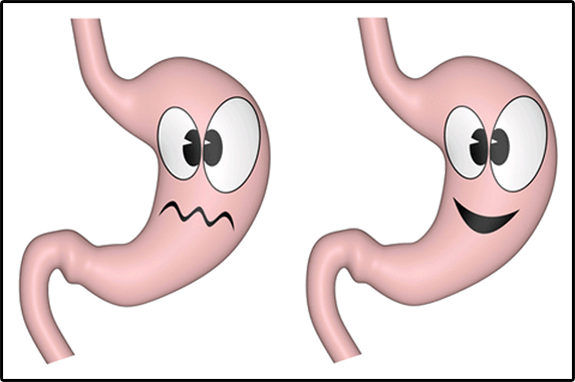
The Importance of Stomach Acid
What You Should Know About Stomach Acid
Hydrochloric acid (HCL), also known as stomach acid, is essential for proper digestion and absorption of the nutrients in the foods we eat. As we age, our body’s ability to make HCL decreases.
Contrary to popular belief, indigestion is often cause by too little stomach acid, not too much.
Wildly popular antacids like Prilosec, Tums and Tagamet (also known as proton-pump inhibitors), neutralize stomach acids even further and may in fact be causing or aggravating the condition they are meant to treat.
Antacids increase the circulation of the hormone gastrin. Gastrin is responsible for stimulating the cells of the stomach’s lining to produce HCL. When you inhibit the production of stomach acid with an antacid like Prilosec, gastrin hormones proliferate in mass in their attempt to fight off the neutralization attempt.
As a consequence, the discontinuation of a product, like Prilosec, causes a rebound acid hypersecretion which persists for at least 2 months. This erroneously convinces the indigestion sufferer that the problem was too much stomach acid in the first place.
One should also understand that when you take antacids, you interfere with the stomach’s natural defense mechanism. Stomach acid is not only important for nutrient extraction, but a lack of it makes the stomach vulnerable to bacterial, viral, candida, parasitic and pathogenic invasions.
Some of the symptoms and dangers of low stomach acid include:
- Autoimmune diseases
- Bad breath
- Bloating
- Belching
- Chronic candida
- Chronic fatigue
- Diarrhea/Constipation
- Dry skin
- Food sensitivities
- Hair loss in women
- Headaches
- Heartburn (often thought to be caused by too much stomach acid)
- Indigestion
- Iron deficiency
- Passing gas after meals
- Rectal itching
- Stomach pain
- Undigested food in stools
Home Check for Stomach Acid
The purpose of this test is to give you an approximate indication as to whether your stomach is producing enough stomach acid.
You will need a cup, spoon, baking soda and water. Do this test first thing in the morning before eating or drinking anything.
- Mix one quarter teaspoon of baking soda in eight ounces of cold water.
- Drink the solution
- Time how long it takes you to belch (burp). Allow up to five minutes.
RESULTS -
Adequate Stomach Acid Levels: If your stomach is producing adequate amounts of hydrochloric acid you should probably belch within two to three minutes.
Excessive Stomach Acid Levels: Early and repeated belching may be due to excessive stomach acid.
Low Stomach Acid Levels: No belching within five minutes means your stomach acid is low.
Belching results from the acid and baking soda reacting to form carbon dioxide gas. The Heidelberg or Gastrocap tests can be employed for confirmation of the results of this test. You will need to pay a visit to your doctor for these tests.
Betaine HCL with Pepsin Trial
If your stomach acid is low, you may wish to do a therapeutic trial with supplemental betaine HCL (hydrochloric acid). If you take betaine HCL after a meal and feel nothing, your stomach is probably not producing enough hydrochloric acid. A normal response to taking betaine HCL is a feeling of warmth in the stomach.
For an individual whose hydrochloric acid levels are lacking, slowly work up to supplementing as many as five (5) betaine HCL capsules after meals. Although this may sound like a lot, in response to a very big meal, a healthy stomach will produce the equivalent of at least 14 betaine HCL capsules. For optimal results, the protein digesting enzyme, pepsin, should be part of the betaine HCL formulation.
Our top-selling Betaine HCL with Pepsin products are as follows:
| Product Name |
Count |
|
250 UltraCaps |
|
100 Capsules |
|
250 Capsules |
|
225 Capsules |
|
625 Capsules |
|
225 Capsules |
ALL orders ship for FREE * No Sales Tax * No Handling Fee
REFERENCES:
Kenneth E.L. McColl, Derek Gillen Evidence That Proton-Pump Inhibitor Therapy Induces the Symptoms it Is Used to Treat Division of Cardiovascular & Medical Sciences, University of Glasgow, Gardiner Institute, Glasgow, UK
Joseph Debe, Ph.D Board Certified Nutritionist STOMACH ACID ASSESSMENT http://www.drdebe.com/stomach-acid-assessment.html |









